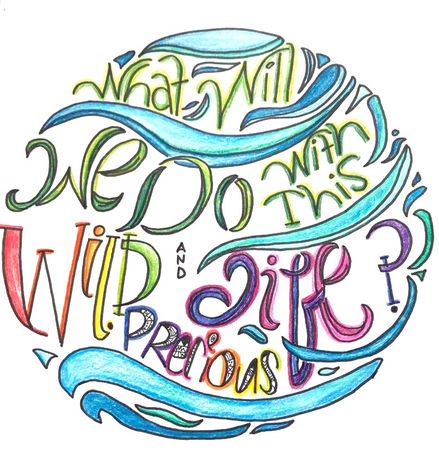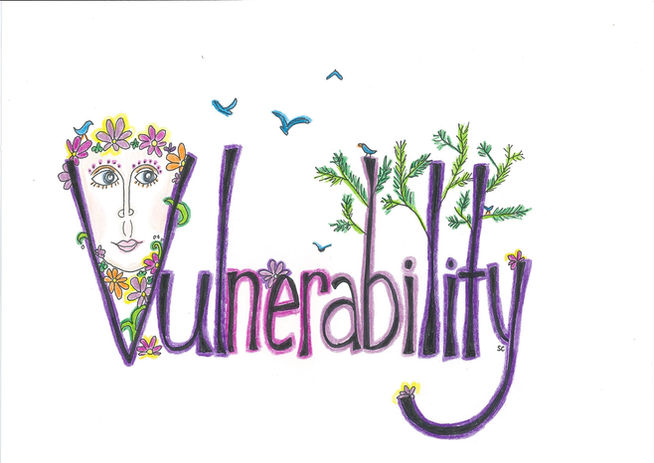Wet Wings:
Thriving Through Breast Cancer
“Cancer Bingo,” 2018
I was diagnosed with breast cancer on November 21, 2017. Three days later my father died of Glioblastoma, a type of brain cancer. This was his second cancer. The first was when I was seven, a non-Hodgkins lymphoma near his heart. We had not spoken much about cancer during my life. Even though my father was sick from chemotherapy, his hair fell out, and he was in and out of the hospital. I remember a sense of dread on the weekends, souring my stomach and gripping my throat. But I don’t remember talking about it. I didn’t even know what that feeling meant. My father kept working, smiling (when he wasn’t angry), not saying a word about what was happening to his body. I grew up with a silent fear of disease and dying. I didn’t know what that feeling meant. I learned to lean on my skills of perfectionism and performance, to shield myself from any reminder that I was an imperfect human. I was pretty good at it: top grades, perfect attendance, a people pleaser. I smiled just like my dad did. But inside, by high school, I was battling depression, panic and anxiety. No one knew. Just like I didn’t know about my dad’s feelings. We were really good at hiding (except on the days we weren’t, when it all came tumbling out. Until we buttoned it back up inside again.)
Then came the day, the call, the news, that I too had cancer. I couldn’t hide from it. And I needed to talk about it. To process it. To understand it. To understand my feelings toward it, this invader into my body. I needed to determine what my cancer meant to me, in relation to the life I had lived before and what I could do now. So, I started to write. A lot. And I discovered I could give my experience with cancer a shape, with letters and words and spaces around words. With statements and questions. With specificity and generality. With poetry.

The shower runs over my body,
Water falling over five tattooed wounds where the biopsy needles punctured me.
Droplets wash away my fears,
leave me with blame:
Was it the aluminum in my teenage deodorant, exposure to childhood yelling and name-calling, the worry for my baby while breastfeeding on antidepressants
fear, anxiety, panic, worry
all the non organic food
teenage cases of Diet Coke
the madness of an unjust world
blaming myself for it all
What did I take in?
What caused these cells to grow?
My body shivers under the warm water
I try to wash the blame away
What good does it do now?
The water falls over my breast and
its hidden cancer,
Tempting me to fall apart.
I won't.
I.
won't.
I watch droplets run
along the curves of my body
I breathe and breathe and breathe
again.
Poetry allowed me to break lifelong silences and stigmas about emotions, especially the uncomfortable, difficult ones. I saw my voice on the page, and shared my poems with others. Poetry helped me make take action in the midst of a debilitating disease. To embrace all of myself.
Trembling hands, I am afraid.
Smiling eyes, I am brave.
Spilling tears, I am angry.
Breathing belly, I am hopeful.
There's room for all of it.
I walk around doing the day to day:
The dishes, the laundry,
so normal
carrying cancer with me
I want to tuck myself into a ball, relinquish my bravery,
give in to sadness.
I want to run miles, insistent on hope.
I want to tell everyone
how many emotions I am carrying.
I want to be silent and not tell a soul. There's room for all of it.

Once I started sharing my poetry, my thought process about cancer, I learned that others wanted to hear my voice. They were thankful for my openness about cancer. And it was at that moment, I knew what I wanted my cancer to mean. I wanted it to be a story about healing, and about the ways that the arts can heal. I wanted it to be my purpose: to help other families like mine, those impacted by cancer and in need of resources, joyful experiences, ways to process emotions and open communication about cancer. And I was equipped to help. The arts were my tools.
Podcast Interview on Stories Connect People with Polly Van Duser










































